Key takeaways:
- Physical comfort and emotional wellness significantly impact participant engagement during workshops.
- Incorporating mindfulness practices, such as short meditations and wellness breaks, enhances focus and understanding.
- Creating a welcoming environment through inclusivity and accessibility encourages open discussions and participation.
- Gathering participant feedback on wellness promotes continuous improvement and fosters a supportive community.
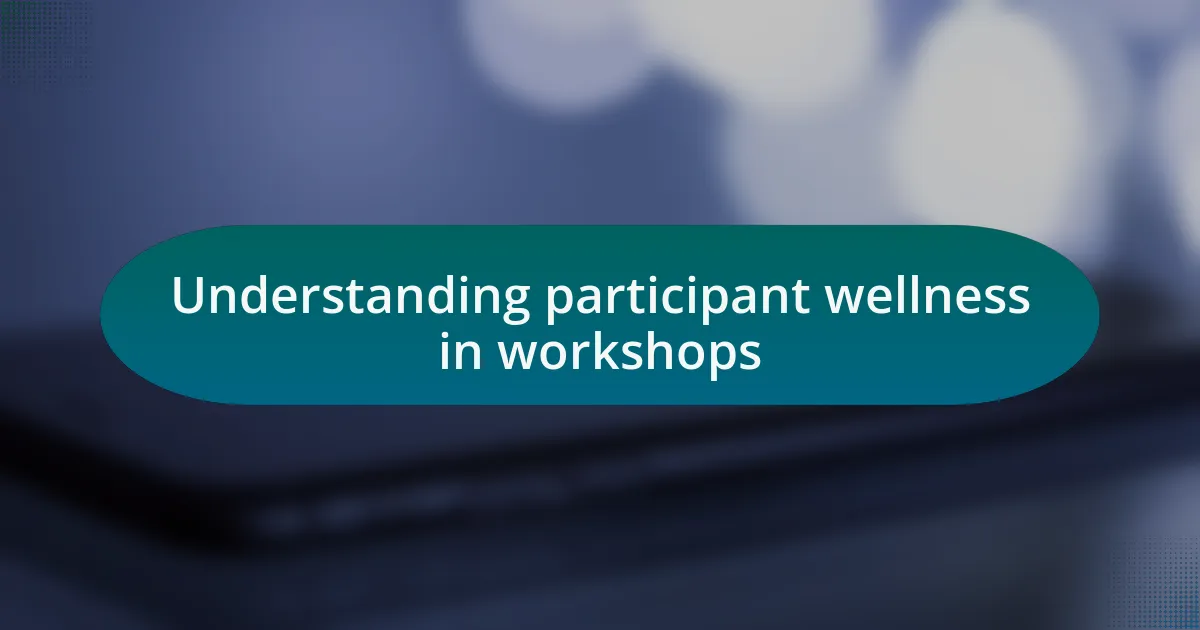
Understanding participant wellness in workshops
When I think about participant wellness in workshops, I’m reminded of the first event I organized where I underestimated the impact of comfort. I recall participants fidgeting in their seats, distracted by the cramped space. This experience taught me that physical comfort is crucial; it’s hard to engage if you’re uncomfortable. Have you ever tried listening intently in a hot, noisy room?
Emotional wellness cannot be overlooked either. I once facilitated a session where participants were encouraged to share personal stories. The atmosphere shifted dramatically as people opened up, creating a deep sense of trust. I’ve seen how vulnerability can spark connection, making the overall experience richer. How often do we create spaces for this kind of emotional sharing?
Additionally, mental wellness plays a significant role in the overall workshop experience. I’ve often integrated interactive activities that challenge participants mentally while fostering collaboration. During a recent workshop, I noticed that breaking up the schedule with engaging discussions improved focus and retention of information. Don’t you think that a little mental stimulus can breathe life into even the driest topics?
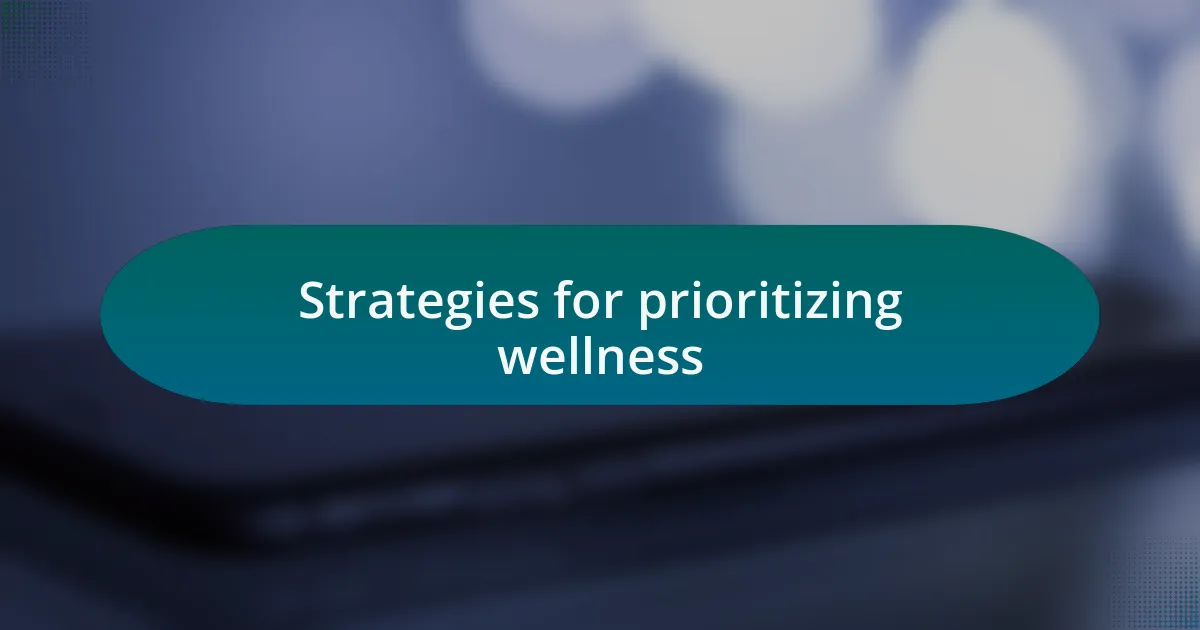
Strategies for prioritizing wellness
One effective strategy I employ is to create a comfortable atmosphere by paying attention to the physical environment. I remember a workshop where I made the decision to use bean bags instead of traditional chairs. The relaxed seating instantly changed the energy in the room; participants were more at ease and willing to engage with one another. Have you noticed how a cozy setting can lead to more open discussions?
In my experience, incorporating wellness breaks throughout the schedule can significantly enhance participant engagement. During one workshop, I included a short mindfulness session, where everyone took a few minutes to practice deep breathing. I witnessed a marked shift in the participants’ demeanor; they returned to the discussion refreshed and focused. Isn’t it amazing how just a few moments of pause can reinvigorate a group?
Lastly, I strive to foster emotional connection through small group discussions. One time, I organized breakout sessions where participants could share their thoughts more privately. The shift was palpable; not only did trust develop quickly, but feedback indicated they felt more willing to contribute in the larger group afterward. Isn’t it interesting how creating safe spaces can unlock deeper engagement?
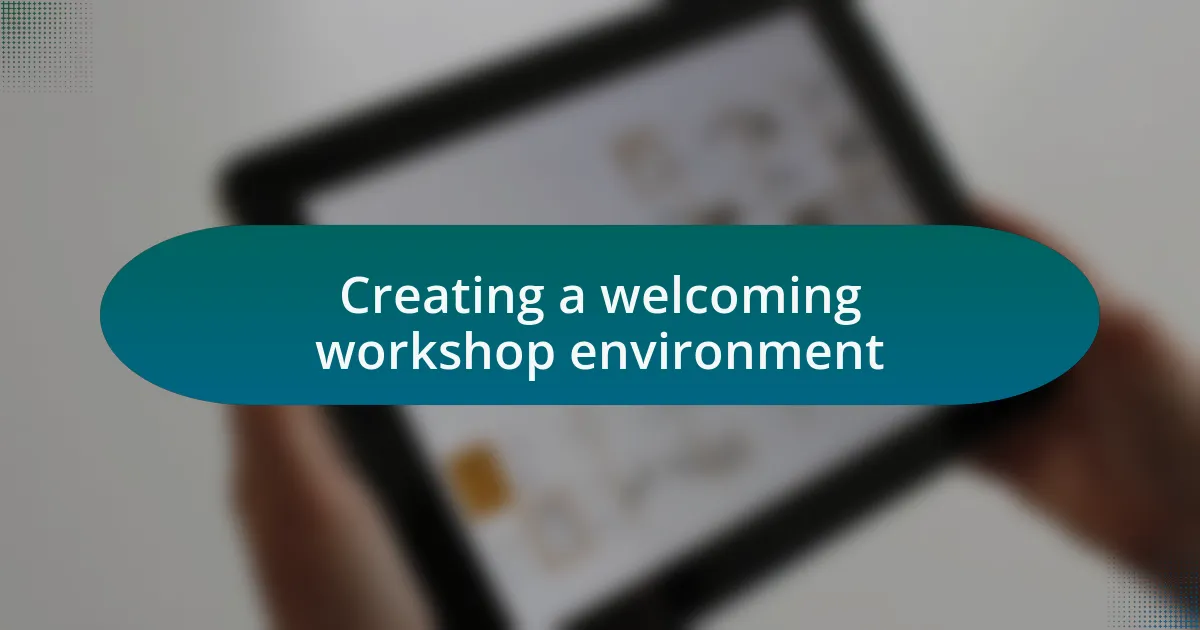
Creating a welcoming workshop environment
Creating an inviting atmosphere starts with intentional decor and design. I once held a workshop in a space filled with plants and soft lighting, and the impact was immediate. Participants seemed to breathe more freely, discussing their ideas in a relaxed, creative environment. Have you ever noticed how a bit of greenery can lighten the mood?
Inclusivity is another vital aspect of a welcoming workshop. I remember a time I made sure to have materials available in multiple formats—like visual aids and written notes. This effort not only acknowledged different learning styles but also made everyone feel valued. It’s fascinating how small gestures can encourage participation from people who might otherwise hesitate.
Lastly, I prioritize accessibility in every aspect. During one event, I ensured that all materials and discussions were accessible to everyone, including those with different needs. I’ll never forget how grateful a participant was for the consideration; their positive feedback reinforced my belief that everyone should have the chance to engage fully. Isn’t it empowering when we remove barriers and open doors for meaningful connections?
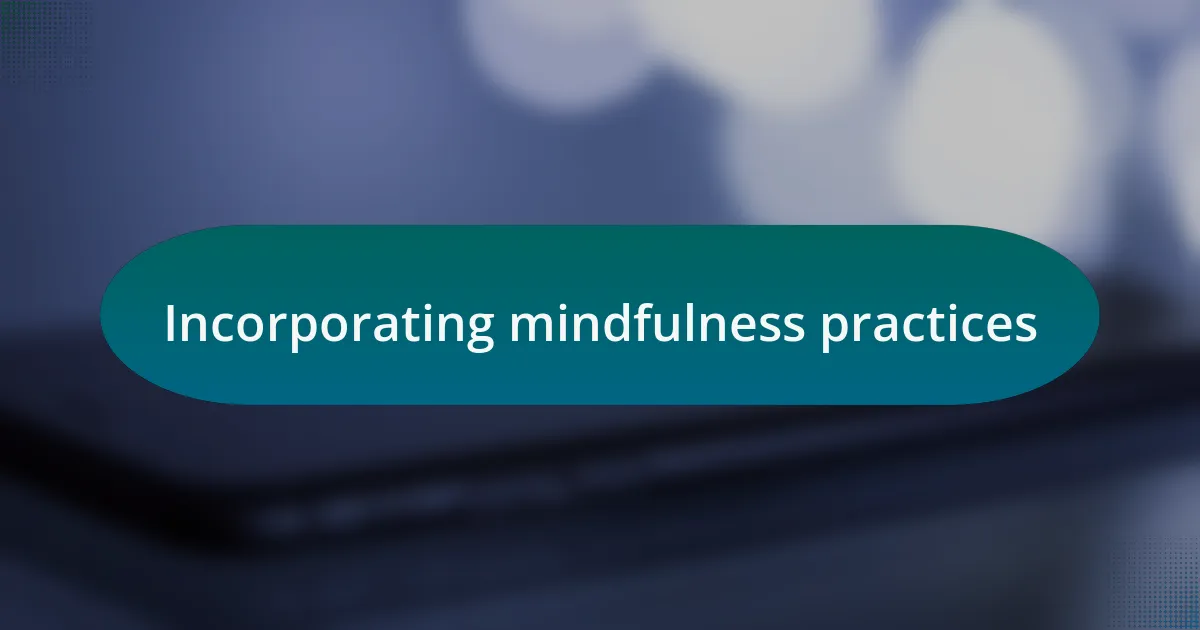
Incorporating mindfulness practices
Incorporating mindfulness practices has become integral to my workshops. I find that starting each session with a short guided meditation not only calms the room but also enhances participants’ focus. I vividly recall one workshop where, after just a few moments of breathing exercises, a participant expressed how it shifted her mindset, allowing her to engage more deeply. Have you ever experienced the power of a simple pause?
Beyond meditation, I integrate mindfulness breaks throughout the agenda. These small intermissions allow individuals to reflect on what they’ve learned and gather their thoughts. I once facilitated a workshop where we took a five-minute break for journaling. The feedback was outstanding; several attendees mentioned how highlighting their key takeaways helped solidify their understanding. Isn’t it interesting how a moment of stillness can lead to clarity amidst information overload?
Finally, incorporating mindful communication practices fosters deeper connections among participants. I encourage active listening and non-judgmental dialogue during discussions. I remember a session where we employed ‘talking stones’—participants communicated using a specific stone, ensuring everyone had a voice. The shift in interaction was palpable; hearing diverse perspectives added richness to our conversations. How often do we truly listen to one another in a fast-paced environment?
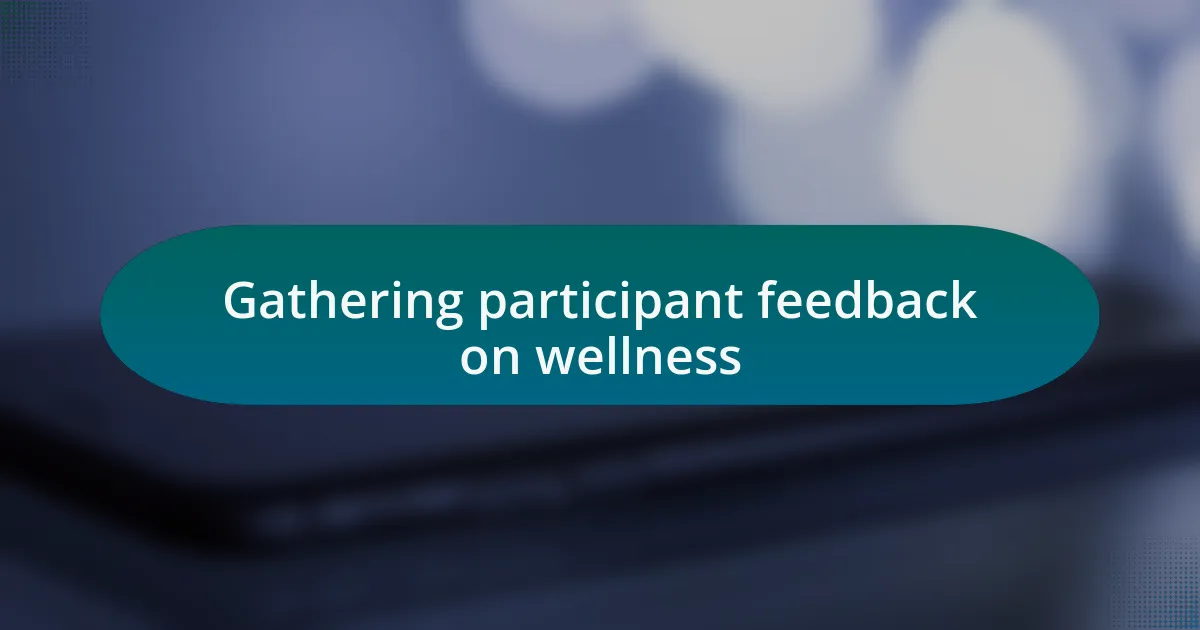
Gathering participant feedback on wellness
Gathering participant feedback on wellness is crucial to enhancing the overall experience of my workshops. After each session, I make it a point to distribute a brief survey focused on wellness aspects. I once implemented a simple question about the level of stress participants felt before and after the workshop, and the responses were eye-opening. It was incredible to see how many individuals reported a decrease in stress, which reinforced my belief in prioritizing their mental well-being.
In addition to surveys, I often facilitate an open discussion at the end of my sessions, inviting participants to share their wellness experiences. One memorable moment was when someone shared how the supportive environment helped them feel more comfortable discussing personal challenges related to their work-life balance. It reminded me of the importance of creating a safe space where participants can openly discuss wellness without fear of judgment. Have you ever noticed how shared vulnerability can lead to profound connections?
I also encourage participants to provide feedback over time through ongoing communication channels. After a recent workshop, I created a dedicated email thread for wellness-related topics. One participant reached out to discuss ways of maintaining mindfulness post-workshop. Their proactive approach showed me that this dialogue is not just a one-time event; it fosters an evolving community focused on wellness. What better way to ensure that wellness remains a priority than nurturing these ongoing conversations?
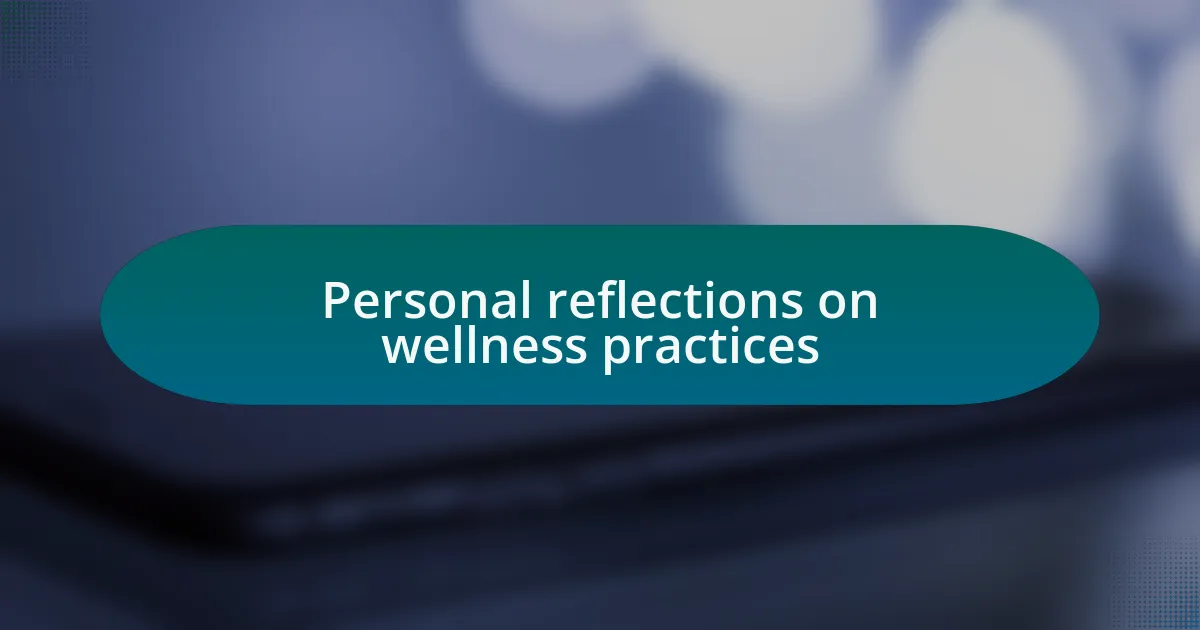
Personal reflections on wellness practices
Personal reflections on wellness practices
When I think about wellness in my workshops, I often recall a session where I introduced a five-minute mindfulness break. Watching participants close their eyes, take deep breaths, and release their tension was a transformative experience for all of us. It made me realize how even a brief pause can create a ripple effect of calmness and clarity, encouraging everyone to embrace their own well-being. Have you ever experienced the power of simply slowing down?
I also remember an instance when a participant approached me afterward, expressing how the emphasis on wellness gave her the courage to tackle her anxiety head-on. Her words resonated deeply; they highlighted how vital it is to prioritize emotional wellness, not just physical wellness. I often wonder if we underestimate the impact of fostering an environment where individuals feel empowered to be vulnerable and seek help. What if every workshop could inspire such courage?
In my journey, I’ve discovered that sometimes the most profound lessons stem from unexpected conversations. There was a time when a participant shared her struggles with burnout, sparking an impromptu discussion that lasted much longer than I anticipated. The raw honesty in that room was a reminder that we all face challenges and that addressing wellness is an ongoing journey, not a checkbox to tick off. Isn’t it fascinating how our collective experiences can forge connections that lead to growth?